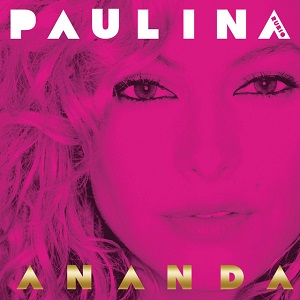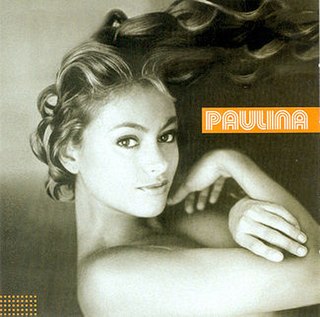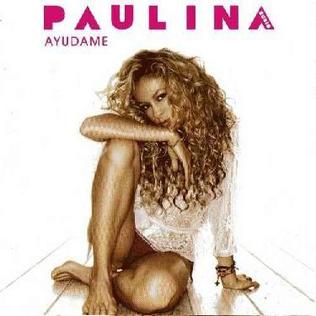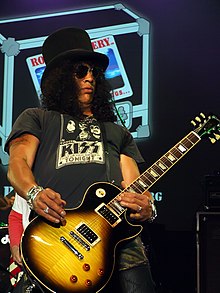
Paulina Susana Rubio Dosamantes is a Mexican singer, songwriter and television personality. Referred to as "The Golden Girl" and "Queen of Latin Pop", she first achieved recognition as a member of the successful pop group Timbiriche from 1982 through 1991. After leaving Timbiriche, she embarked on a solo career. Rubio has sold over 15 million records, making her one of the best-selling Latin music artists of all time.

Ananda is the eighth studio album by Mexican singer-songwriter Paulina Rubio, released on September 18, 2006, through Universal Music Group. Its pop rock music incorporates latin, dance, folk, electropop, alternative and flamenco styles with instrumentation from synthpop beats, guitars, drums, synthesizers, strings and Spanish musical instruments. Its themes range from love, empowerment and dancing. Contributions to the album's production came from a wide range of producers, including Cachorro López, Rick Wake, Tricky Stewart, Áureo Baqueiro, TOY Hernández and Gustavo Santaolalla. Among the songwriters and artist collaborators appear on the album are Xabi San Martín from La Oreja de Van Gogh, Slash from Guns N' Roses, Juanes, Julieta Venegas and Coti.

"Ni Una Sola Palabra" is a song recorded by Mexican singer Paulina Rubio for her eighth studio album Ananda (2006). It was released as the lead single from the album on July 23, 2006, by Universal Music. The song was written by Xabier San Martín, keyboardist and composer from Spanish pop band La Oreja de Van Gogh, and produced by Cachorro López. It is a pop rock song with synth-pop and new wave elements.

Paulina is the fifth studio album by Mexican singer Paulina Rubio. It was released on May 23, 2000 internationally by Universal Latino and marks her first record production with American global music corporation. Rubio worked with writers and producers such as Estéfano (mostly), Chris Rodríguez, Armando Manzanero, Juan Gabriel, Christian De Walden, and Richard Daniel Roman. The album explores a more variety sounds much different to the vein of her albums with EMI Music, and has an overall latin pop and dance-pop vibe, with influences from rock, ranchera, bolero, funk and house. Elaborating a "synthesis of the end of the millennium" theme for the album, Rubio reinvented her image.

24 Kilates is the second studio album by Mexican recording artist Paulina Rubio, released by EMI Capitol de México on November 16, 1993. Following the success of her debut album, Rubio reunited with the Spanish producer Miguel Blasco, who produced her second music project, while the songs were written mostly by Cesar Valle, Don Matamoros and C. Sánchez. The recording sessions took place in Spain during the summer of 1993, coinciding with Rubio promotion her first concert tour in South America.

Mexican singer-songwriter Paulina Rubio has released eleven studio albums, fifteen compilation albums, 62 singles, ten promotional singles, and has made some eleven guest appearances. In 1992, Rubio signed a recording contract with record label Capitol Latin in order to launch her career as a solo artist, after recording ten albums with Timbiriche between 1982 and 1990.

"Ayúdame" is a song recorded for Paulina Rubio's eighth studio album Ananda. The song was co-written with Argentinian singer-songwriter Coti Sorokin who Rubio previously collaborated with on his single "Nada Fue Un Error" the previous year, and also being one of the few songs Rubio has co-written credits on the album. "Ayúdame" was released on April 4, 2007 as the album's third single. The single had moderate success on the charts reaching a peak of number 36 on the Billboard Hot Latin Songs

"Don't Say Goodbye" is a song by Mexican singer Paulina Rubio, taken from her sixth studio album and crossover album, Border Girl (2002). It was written by Joshua "Gen" Rubin and Cheryl Yie and produced by Rubin. "Don't Say Goodbye" is a dance-pop song and talks about rejecting the idea of not saying goodbye to a lover. The song was released through Universal Records on 29 April 2002 as the lead single from the album. In Latin America and France, a Spanish version of the song titled "Si Tú Te Vas" was released, written by Luis Gómez Escolar.

"Y Yo Sigo Aquí" is a song recorded by Mexican singer Paulina Rubio for her fifth studio album, Paulina (2000). It was released as the third single from the album on November 13, 2000. Also, it was released in January 2001 in the United States and Europe. Jointly written and composed by Estéfano, "Y Yo Sigo Aquí" is a dance pop and Europop song along pulses with a synthesized house and techno beat. It was one of the most successful songs of the year in the world and is recognized as one of Rubio's signature songs.
Amor, Luz Y Sonido Tour or Love, Light & Sound Tour was the thirth concert tour by Mexican singer Paulina Rubio, in support of her eighth studio album, Ananda (2006). The tour began on 23 February 2007 in Lanzarote, Canary Island at the Campo de Fútbol Arrecife and concluded on 30 September 2007 in Córdoba, Argentina at Orfeo Superdomo, consisting of 14 shows in Europe, 31 in United States and 8 shows in Latin America. It is considered her most extensive tour in Spain.

Gran City Pop is the ninth studio album by Mexican singer Paulina Rubio released by Universal Music Group on June 23, 2009. The album expanded the Rubio's stylistic palette by combining elements of genres such as ranchera, hip-hop, eurodisco or arena rock, and she became more involved in songwriting and creative elaboration, extracting influences from various dance-pop-based genres including electropop, synth-pop and eighties British pop.

"Causa y Efecto" is a song performed by Mexican singer Paulina Rubio. The song was recorded for her ninth studio album Gran City Pop, and was released as the lead single on March 26, 2009. Causa y Efecto became a hit reaching number 1 in the U.S. Billboard Hot Latin Songs and Hot Latin Airplays. Causa y Efecto was produced by Cachorro López and written by Mario Domm and Mónica Vélez. "Causa y Efecto" is Rubio's first number one single in the Billboard Hot Latin Songs since Ni Una Sola Palabra in 2006. "Causa y Efecto" was awarded "Song of the year pop/ballad" by ASCAP.

"Ni Rosas Ni Juguetes" is a song recorded by Mexican recording artist Paulina Rubio for her ninth studio album Gran City Pop (2009). It was written by Claudia Brant, Noel Schajris and Gianmarco Zignago, and produced by Cachorro López. Due to popularity, the song was announced as the second single on July 20, 2009, released official worldwide on August 17, 2009 by Universal Music Latin Entertainment. "Ni Rosas Ni Juguetes" is a Latin pop song with ranchera and hip-hop influences. The song's lyrics discusses Rubio's decision to overcome a relationship and her empowerment.

"El Último Adiós" is a song recorded by Mexican singer Paulina Rubio for her fifth studio album Paulina (2000). It was released as the second single from the album on July 17, 2000 by Universal Latino. Rubio co-wrote and co-produced the track with Estéfano, and was originally conceived it as a ranchera-hip-hop-styled song. Lyrically, its a break-up mood.

"Lo Haré Por Ti" is a song recorded by Mexican singer Paulina Rubio for her fifth studio album Paulina (2000). Written by Estefano and produced by Chris Rodriguez, the bolero-influenced pop rock song was then released as the lead single from Paulina on January 11, 2000, through Universal Music Latin, Polydor Records and Muxxic Records. The song marks Rubio's "comeback" single after the dissolution of her contract with EMI in the late 1990s. Lyrically, the song is about a woman who is willing to do anything for the man she loves, with refers to the tangos of the French Argentine artist Carlos Gardel.

The Gran City Pop Tour is the fourth solo concert tour by Mexican pop and rock singer Paulina Rubio. The tour began in September 2009 in support of her ninth studio album Gran City Pop. The tour began in Primm, Nevada and ended in Medellín the following year."Gran City Pop tour" was considered her most successful tour to date; the tour visited over 13 countries in North America, South America and Europe. The last sold out concert was recorded at the Auditorio Nacional's 10,000+ crowd in Mexico's capital, Mexico CIty.

"Nieva, Nieva" is a song performed by the Mexican singer Paulina Rubio, written by Cesar Valle and C. Sánchez and produced by Miguel Blasco. The song was recorded in Madrid, Spain, through the promotion of Rubio's debut album, La Chica Dorada and the recording sessions for her second album. It was eventually released as the lead single from her second studio album 24 Kilates on September 29, 1993.

"Vive El Verano" is a song recorded by Mexican singer Paulina Rubio for her fifth studio album, Paulina (2000). It was released as the fifth single from Paulina on June 19, 2001 by Universal Latino. It was written by Richard Daniel Roman and Ignacio Ballesteros, and produced by Francisco Pellicer.

"Me Gustas Tanto" is a song recorded by Mexican singer Paulina Rubio for her tenth studio album, Brava! (2011). It was released by Universal Latino as the lead single from the album on September 2, 2011. The track was written by Rubio, Nacho and Andrés Recio, whilst production was handled by RedOne.
"Yo Soy" is a song by Mexican singer Paulina Rubio, released by Sony Music Mexico on October 14, 2021. It marks her first song recorded and released by the Sony Music label, after two decades on Universal Music. Rubio wrote the song with Felipe González, Valentina Rico, Omar Koonze, Andy Clay and Andres Castro, who also produced. "Yo Soy" is a Latin pop, ranchera-mariachi-inspired and trap song which features acoustic guitar harks back to Rubio’s Mexican roots. Lyrically, Rubio "manifest" her independent self as a single mom and artist.
















